Innovation has long played a central role in Africa’s economic development. But with shifting political alliances and evolving capital landscapes, how can the continent harness technology to continue accelerating its socioeconomic transformation? At the London Business School Social Impact Conference organised by the Social Impact Club on 16 April 2025, the panel “Investing in Change: The Africa Innovation Business Case” featured Jennifer Takyi, Ndabezinhle Masuku, and Titilola Bello, moderated by Tiago Ivo Martinho, explored how innovation is reshaping Africa’s development narrative and why it has become a critical pathway to resilience, equity, and opportunity.
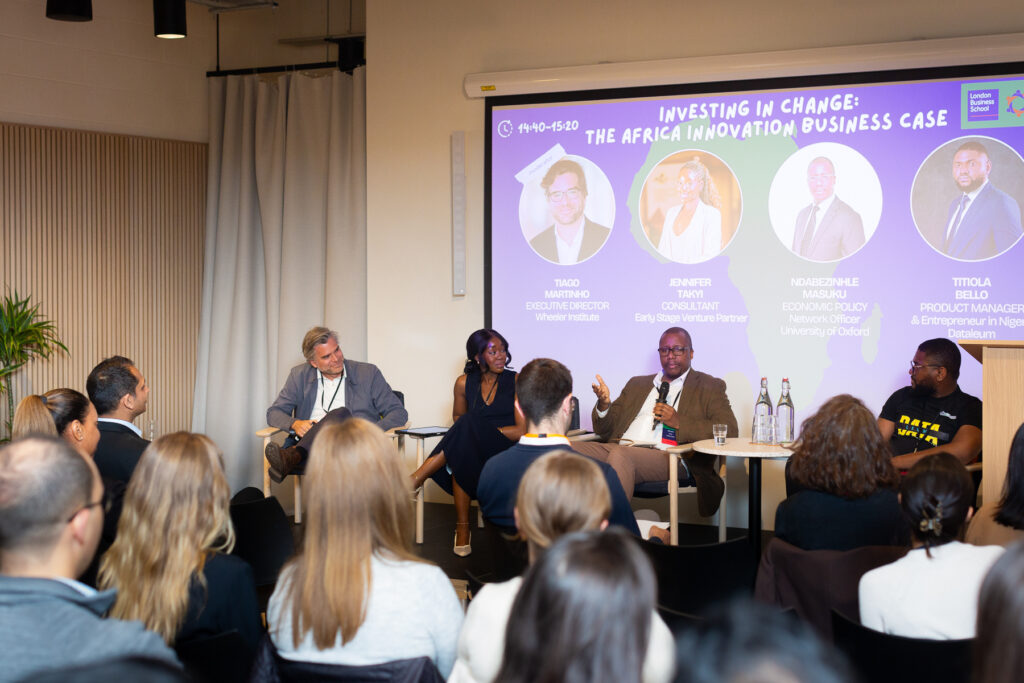
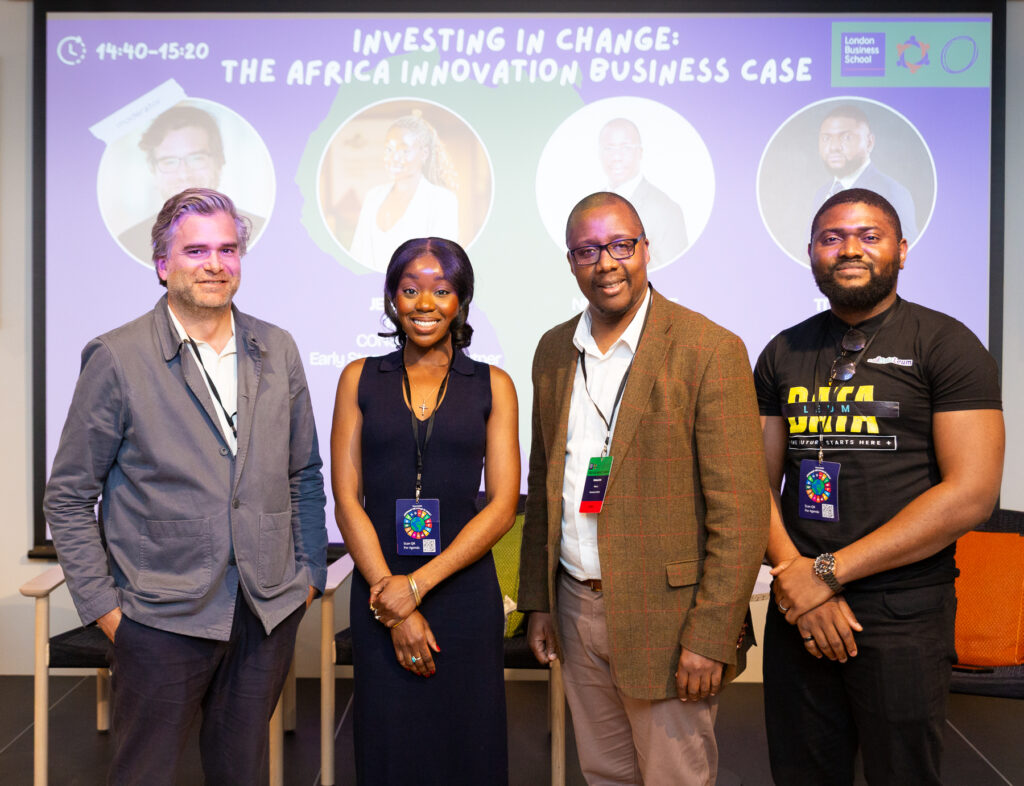
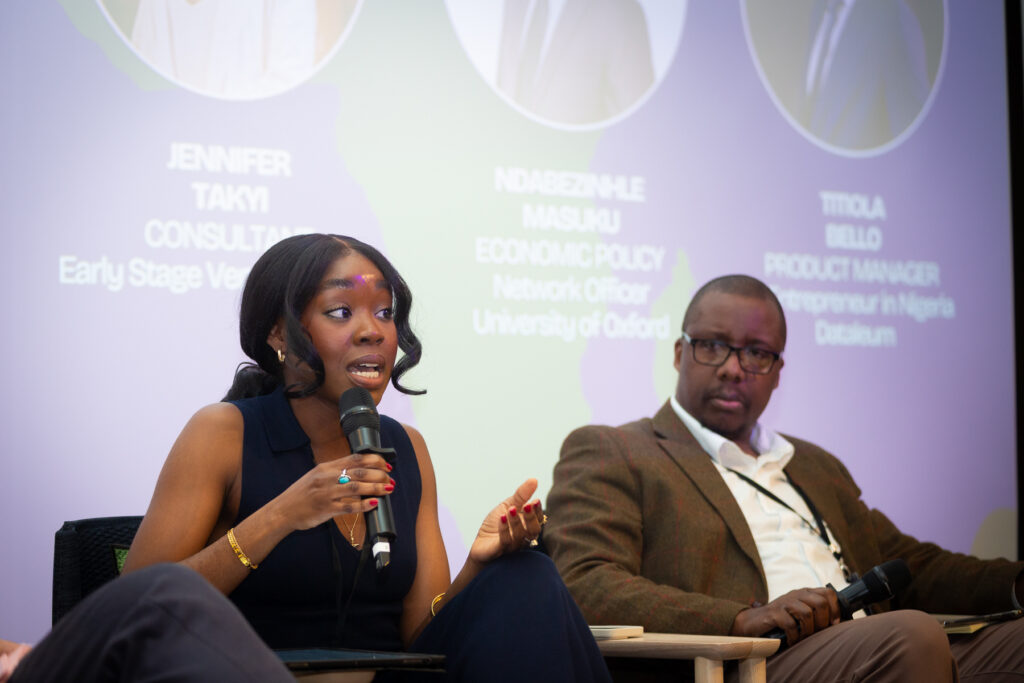
Innovation as a Necessity, Not a Luxury
Opening the session, Takyi framed innovation as a fundamental force in Africa’s growth journey. Drawing on her experience designing venture programs and connecting capital to early-stage businesses, she highlighted how technology has enabled African countries to bypass traditional development hurdles—particularly through mobile expansion and the rise of fintech. This leapfrogging, she argued, positions the continent at a crucial inflection point. With the right investment and support, innovation can help solve pressing social challenges, from healthcare access to financial inclusion and workforce productivity.
Both Masuku and Bello echoed the sentiment that innovation in Africa is not a luxury—it is a necessity, and increasingly, a responsibility. Masuku explained that many African innovations arise from the need to navigate around systemic limitations. An iconic example such as M-PESA, an innovative mobile phone-based money transfer, payment, and micro-financing service, demonstrates how solutions born from necessity can fundamentally transform communities at scale. Bello built on this, reflecting on his work in edtech, which has upskilled over 30,000 individuals and connected thousands to jobs. These interventions have not only created jobs but broken poverty cycles—proving how technology can unlock long-term opportunity and social mobility.
Ownership and the Shift in Capital
As political and economic conditions continue to shift, Africa’s innovation progress is at a crossroad. The panel identified the current moment as both a challenge and an opportunity for the continent to build resilience and assume greater ownership over its innovation agenda. With traditional sources of development finance—such as DFIs and Western aid—stepping back, Takyi highlighted the urgency of mobilising domestic capital. There is significant, yet still under-leveraged, potential of African institutional investors—such as pension funds, insurers, and high-net-worth individuals , some of whom are already allocating capital to funds investing in local tech and innovation-driven businesses. However, she stressed that sustaining innovation requires more than capital—it demands a broader shift in priorities and long-term engagement. African investors and policymakers must take the driving seat in driving the digital economy and nurturing home-grown solutions.
Masuku pointed out that this funding gap extends beyond DFIs. Even philanthropic capital is becoming less certain, adding pressure for African-led financing to rise to the occasion. Bello added that this moment should serve as a wake-up call for national and local stakeholders to step up. To foster innovation that is sustainable and locally relevant, governments and institutions need to rethink funding criteria, improve capability building, and develop policies that support innovation from the ground up.
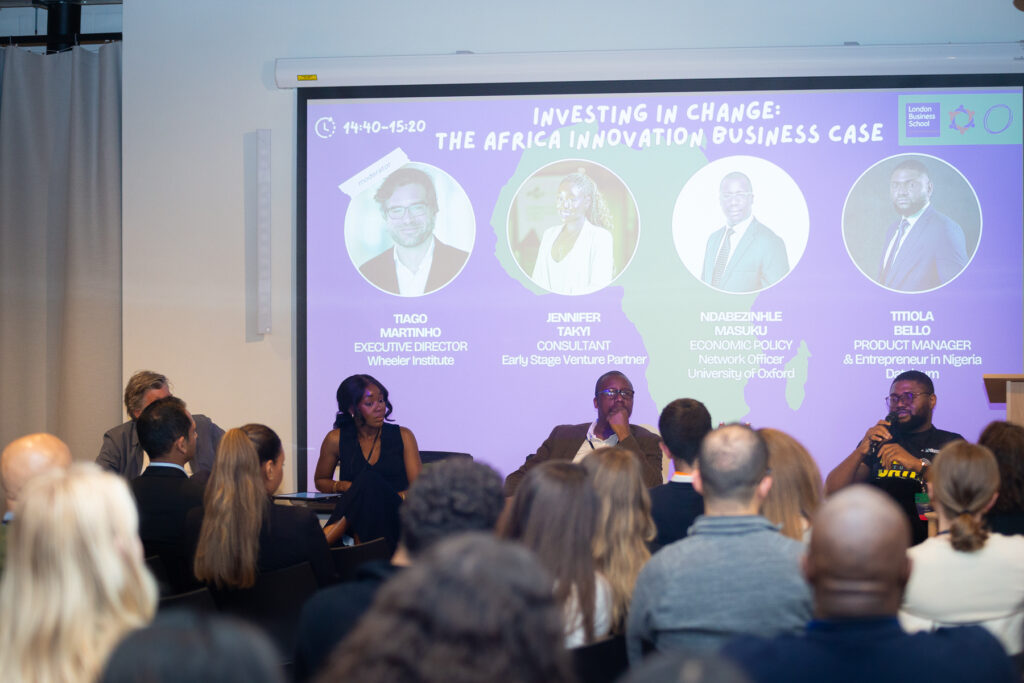
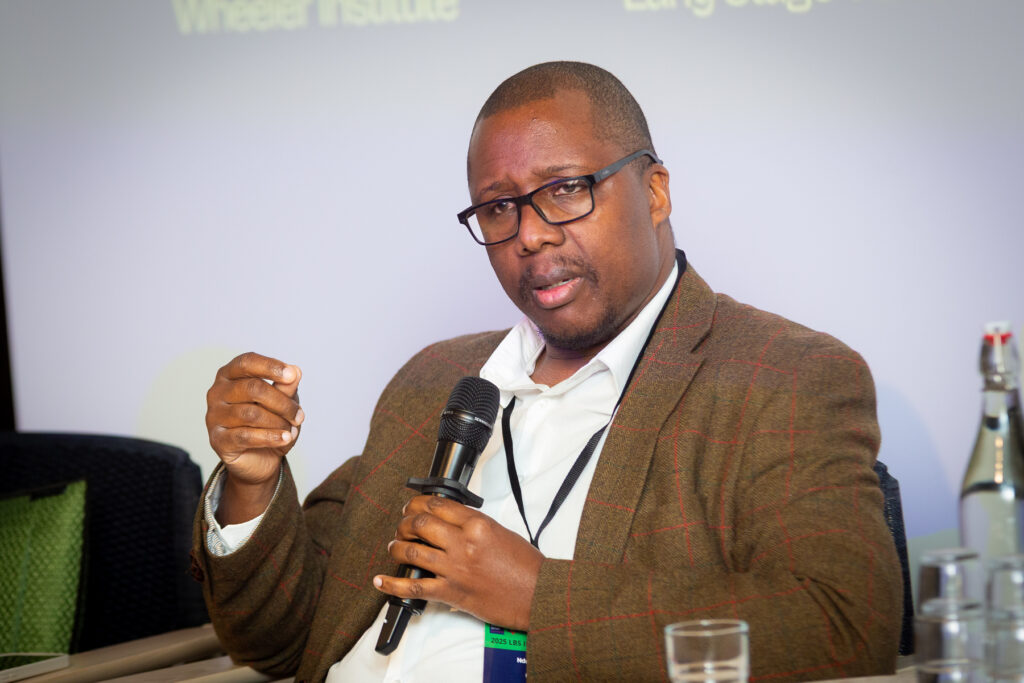
Building the Ecosystem and Environment, Not Just Startups
The panel also emphasised that Africa’s innovation success depends on building an enabling environment—not just backing individual startups. While promising ventures are emerging in fintech, edtech, and agri-tech, many remain isolated and disconnected from each other. Masuku pointed out the challenge lies not in a lack of ideas but in the absence of coordinated systems to support them. Mapping innovations, connecting entrepreneurs with resources, and fostering cross-sector collaboration are critical next steps for scaling impact.
Takyi added that while there is growing investment interest in African innovation, infrastructure remains a major bottleneck. Reliable electricity, broadband internet, and basic data infrastructure are still inconsistent across many regions. While Africa has made remarkable progress by bypassing some legacy systems, full participation in the next wave of global technological transformation, particularly artificial intelligence, will require significant investment in the foundation and infrastructure for innovation.
AI for Africa, by Africa
Artificial intelligence presents both significant risks and immense opportunities for Africa. As global tech companies increase their presence across the continent, concerns are raised that many of these investments are creating low-skilled jobs without developing local capacity. There is a danger that Africa may become a consumer of AI rather than a creator.
The panel advocated for a shift toward home-grown, AI-native innovation. For Africa to participate meaningfully in the AI economy, it must invest in talent, research, infrastructure, and proprietary technologies that reflect local languages, contexts, and needs. Responsible and inclusive AI development will require deliberate policy choices and an ecosystem that supports long-term skill-building and innovation ownership.
Advice for Future Innovators
To close the session, the panellists shared practical guidance for students and professionals interested in contributing to Africa’s innovation future. Takyi encouraged newcomers to remain open to diverse experiences—even those outside the typical tech or finance paths—as they may provide unexpected insights and valuable skills.
Masuku stressed the importance of collaboration. Africa’s most successful innovations, he argued, are those grounded in local knowledge and community-driven design. Working closely with local partners and staying teachable are key to achieving real impact.
Bello emphasised the need for cultural literacy and local engagement. Africa is incredibly diverse—with countries like Nigeria alone home to over 500 languages. To design solutions that truly resonate, innovators must understand the specific needs, languages, and nuances of the communities they aim to serve.
Speakers

Jennifer Takyi is a strategy consultant and early-stage venture partner. She focuses on bridging the gap between investors and high-growth businesses in Africa. She works with pre-seed to pre-Series A founders in Senegal, Ghana, Nigeria, the UK, and Europe, helping to scale ventures that drive innovation and inclusive economic development.
Jennifer has designed and delivered venture development programmes for the UK and Ghanaian governments, as well as for corporate partners, to build strong entrepreneurial ecosystems. Jennifer holds a Bachelor of Laws from the School of Oriental and African Studies, University of London and a Bachelor of Public Affairs and Policy Management from the Carleton University.

Ndabezinhle Masuku is an experienced strategist and finance professional with over 25 years of experience in organisational transformation, governance, and financial leadership across Africa and the UK. He currently serves as the Economic Policy Network Officer at the Centre for the Study of African Economies at the University of Oxford’s Blavatnik School of Government, where he works at the intersection of policy research and implementation to support sustainable development across the continent.
Previously, he held senior roles including Chief Financial Officer and Executive Director, with expertise spanning public finance, economic reform, and institutional development. He also focuses on inclusive innovation and serves as a Trustee of Innovation for Africa. He is a Fellow of the Institute of Public Accountants (Australia) with reciprocal fellowship in England and Wales, with degrees from Solusi University and EMBA the Quantic School of Business and Technology.

Titilola Bello is a founder, manager, and entrepreneur based in Nigeria and the UK. He co-founded Dataleum, a leading edtech start-up that has upskilled over 30,000 individuals, equipping them with critical digital skills and pathways into employment. Dataleum was named Africa EdTech Startup of the Year in 2023 by the Global Startup Awards.
Titilola focuses on technology, education, and innovation, with a strong passion for empowering the next generation through practical, future-ready training. He holds academic qualifications from Babcock University and Oxford Brookes University.
About the writer

Luise Lin is an MBA 2026 candidate at London Business School and an Outreach and Communication Intern at the Wheeler Institute for Business and Development. Prior to joining London Business School, she worked at Boston Consulting Group as Consultant in Australia, where she advised clients across private and public sectors as well as social enterprises. Luise is passionate about leveraging managerial science, innovative business models, and financial solutions to drive scalable economic development impact in developing regions. She is particularly interested in the intersections of management, policy and social impact, exploring how private sector solutions can contribute to sustainable development.
